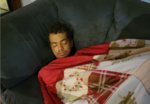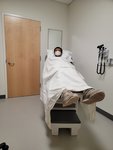

It has now been six years since Marquise Reynolds of Onalaska received his first liver transplant.
Now 21 and hoping for a third liver transplant to become available, his mother, Dawn Reynolds, said doctors are still trying to figure out exactly what keeps causing Marquise’s body to reject his transplants.
Facing a life-threatening situation from the age of 15 has taken a toll on the young man, who spends most days too sick to get off the couch and too weak for a five-minute walk in the neighborhood. And in spite of being able to complete his high school diploma and a few college courses, Dawn said it breaks her heart when her son asks her if she thinks he is a loser because he cannot hold a job or drive a car.
“It’s sad because he’s constantly saying, ‘when is my life going to start?” Dawn said. “I believe he’s going to be OK. It’s just difficult, especially for him, to wait.”
In early 2015, Marquise was diagnosed with liver failure due to Drug Reactive Eosinophilia with Systemic Symptoms (DRESS). Basically, two medications he had been taking for acne had worked together to destroy his liver. He was able to quickly receive a donor liver, which worked for about four years before it began failing. His second liver transplant was in May 2019, and he began experiencing severe rejection issues within the first month. Now, the family waits, said Dawn, and the doctors are working on figuring out the medical enigma of why this young man’s body keeps rejecting livers and how they can help him move past this phase.
“There’s days when he’s hopeful he’s going to have a future, but other days when he like ‘mom, what if I don’t wake up from the surgery?’” Dawn said. “I tell him ‘God didn’t save your life twice to take you now.’”
Each week, Marquise visits several different doctors and clinics so his health can be monitored closely. One of the benchmarks doctors use for someone in Marquise’s position is called a “model for end-stage liver disease” (MELD) score, which is a number that indicates how well his liver is working. A higher MELD score means his liver is functioning worse, which puts him higher on the needs list for transplants, but means he is in more danger. Dawn said his MELD scores will go up suddenly and then dramatically decrease just as quickly. She said it is frustrating not knowing when he might receive a new liver, but she has confidence in the medical team surrounding them.
“The doctors monitor his bloodwork every week. They’re not going to let him get to the point of no return,” Dawn said. “They’re doing everything they can to figure out his case and help him.”
In July, Marquise nearly received a new liver. Dawn said they were notified it was their turn. Marquise was checked into the hospital and prepared for surgery, only to find out at the last minute the donor liver was too large for him. Dawn said they were told that the perfect liver for Marquise needs to come from someone who is 150 pounds or lighter and of very small stature. The gravity of that situation is not lost on Marquise’s family.
“We, unfortunately, know it needs to come from a child, which is upsetting,” Dawn said. “It is that thought that you know someone has to lose their child. With the first liver, someone had to lose their child. With the second liver, someone had to lose their child. And that’s still our thought this time. I don’t want anyone to have to lose their child. But I don’t want to lose my child, either.”
Dawn explained that Marquise has also lived with cerebral palsy and attention deficit disorder since birth and his low liver function puts extra toxins in his bloodstream, further affecting both his physical and mental health. Physically, he is 21, but mentally he is more like 16, she explained. Still, she added, he is a man with a kind heart who will help an elderly shopper reach something at the grocery store, even if he barely has the strength to stand.
“Even as weak as he is and sick as he is, he wants to help people,” Dawn said.
In the last year, the Reynolds family was able to sell their home in Onalaska and purchase a home a little more than an hour from Marquise’s medical team. While it still means long drives, it at least means that Marquise and Dawn can be back in the same house with their family instead of separated for long stretches of time. Dawn’s mother, Kathleen Reynolds, moved into the new home with them to help out with the other kids while Dawn’s father, Zay “Rick” Reynolds, still lives in Centralia and travels to the new home to help out on the weekends.
But, of course, the biggest change in the last year has been the COVID-19 pandemic. Besides Marquise, Dawn said she has an older son living with an autoimmune disorder and her father has COPD, so the threat of a COVID infection in her family is serious. She also said it is uncertain if Marquise will be eligible for a COVID vaccination because of possible side effects from the DRESS syndrome.
“So, for us, it’s sanitizing, masking, staying 6 feet away. Basically, keeping him in a bubble,” Dawn said.
A gofundme.com crowdfunding campaign for the Reynolds family is still active, and Dawn said they appreciate all the help they have received. Dawn said one of the biggest misconceptions they run into is why they need financial assistance if insurance covers Marquise’s medical care. Dawn said it is the many other expenses that insurance doesn’t cover that makes it difficult for the family to make ends meet when you have a member of the family who is health compromised.
“What (insurance doesn’t) pay for is some of his medications and the wear and tear on my vehicle driving him to doctors’ appointments. I pay out of pocket for at least three or four of his medications, which aren’t cheap, and he pretty much needs them to survive,” she said. “He has to have special laundry soap because his skin is so sensitive, he breaks out in a rash. There’s a lot of things insurance doesn’t cover.”